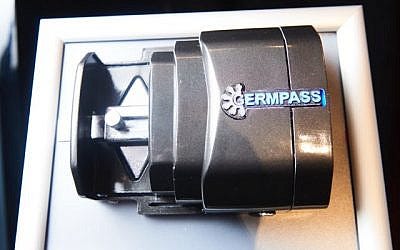I was traveling last week and found myself in the familiar space as so many of my readers as having to use a public restroom. I can’t begin to tell you the horrors that went through my mind as desperation took hold and gave me no choice. I’m being more graphic here than I’d like to be, but it’s to make a point about something that I saw this week that can help change that experience for me and for all of you out there, forever.
When I received the media alert for a new company called Microlumix I was curious. A startup biotech firm has built a system of devices that kill virtually all traces of bacterial and viral agents on touchpoint surfaces that most of us use daily; doorknobs and handles, elevator buttons, public bathroom latches, for now. As Debra Vanderhoff, the company’s Chairman & Chief Operating Officer suggested, they are also working on a device that does the same for toilet seats too.
This all sounded too lofty for me, but I saw the product and now understand better. Imaging taking simple ideas and basic technologies and turning them into something new and useful? It’s a recipe for success. Not to say that the technology is simple, because I do not quite understand how to create it, but they are concepts that have been around for a long time being put to new and fanciful use.
GermPass, this Microlumix system, is first off, basic slide covers for door handles and latches. They are small metal and plastic cases that fit over the door entry nodes that humans usually grab with their hands. These cases cover the node (handle, nob, latch, whatever) and when a hand comes near, a sensor detects the movement and slides the cover off, and allows someone’s hand to grab the lever and open the door. What you don’t see is what happens inside the device. I am going to put this into layman’s terms because that is how I understand this system – Ultraviolet LED (UVLED) lights, connected to a microprocessor that calculates and emits a sequence of pulsating lights surround the touchpoint and sanitizes it.
See a video Demonstration Here
Now, for the science behind it. UV irradiation is successfully used as a biocide for a wide range of bacteria and infections for food and even air disinfection, and it has been used for eradication of microorganisms that bring on Legionnaires and many other diseases that are often caused by some physical contact. The intensity of UV irradiation and the amount of time that the micro-organisms are exposed to the radiation affect its efficacy. Microlumix has spent years figuring out the scientific sequences and timing that do just that.
In fact, in a study done in a Jacksonville, Florida, pediatric clinic, the devices were 100% effective in killing the germs and organisms in under one second. Speed is important here, as these devices will be in continuous use on doors in hospitals, healthcare facilities, hotel rooms, cruise ships, or floating Petrie dishes, as they are known to be these days.
An infectious agent introduced into the environment of a cruise ship has the potential to be distributed widely across the boat and cause significant morbidity. The average cruise ship passenger is over 45 years old and often has preexisting medical issues. So, it is important that the introduction of an infecting agent and means of its transmission be minimized. The cruise industry has been hit hard by Covid-19 and the first cruise line to say that they will be a wholly GermPass enabled facility will likely be the ones to get the most business and up and sailing to full capacity.
That takes me to airplanes. Were you ever among the last people to use an airplane’s lavatory after a meal or 45 minutes before landing? I would hope that GermPass is rapidly deployed through the airline industry.
As I began, this seems like a simple idea. Disinfect the touchpoints and help save lives. One thing I didn’t know before I attended was that many people contact secondary illnesses merely by being in a hospital for treatment or care for something else. Hospitals are places of healing and getting better, but too many people come away from hospital stays with serious infections; some never leave. From mild, surgical site infections, to severe sepsis, infections can strike hospital patients, with serious consequences. Hospital-acquired infections (HAI) are a major health problem, and hospitals and their staff have a responsibility to take all reasonable steps to prevent patients from contracting them.
An HAI is an infection—bacterial, viral, or fungal—that a patient did not have before arriving in the hospital and picks up during a stay. The most common types of infection are bloodstream or gastrointestinal infections, pneumonia, UTI’s and surgical site infections. A harmful infection that can be acquired in a hospital setting is known as MRSA, or methicillin-resistant Staphylococcus aureus. It is caused by a type of bacteria that resists most antibiotics, so it is especially dangerous, and MRSA most often occurs in the hospital and other healthcare settings.
What we know too, is that these are mostly preventable. All it takes is keeping patients, equipment, instruments, staff members’ hands, and other touchpoints clean and sanitary. The GermPass system installed on doors and handles, as well as eventually some modified form of this device for other equipment, would make any hospital the go-to healthcare center in any region.
What I found when I went to this event was a very good group of people who genuinely gave their time and energy to develop something that has yet to be introduced by anyone else. A basic need filled that can help millions of people and it is a wide-open market with many applications, from hospitality to health, from real estate development to schools.
I didn’t ask, but should have, was whether any of this technology was developed in Israel. Whenever I hear microchips and biotech, I think Silicon Wadi, but that is a story for a different time. I just do not know, and at the point of publishing this, I didn’t have an answer.
As I left the Harvard Club on Tuesday, 2.22.22, I kept looking at everything I touched – with my sleeve and not my hands, at this point – and imagined a world where everything was GermPass enabled.
Also Published on my Medium page





